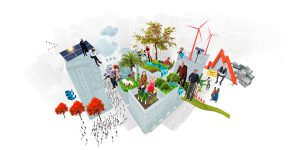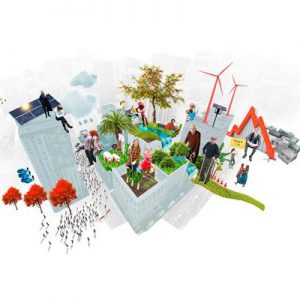

 Urban Europe and Belmont Forum joint call
Urban Europe and Belmont Forum joint call
The Sustainable Urbanisation Global Initiative (SUGI) Food Water Enery Nexus approach provides a unique collaboration framework for technical and social scientists, small and large businesses, cities and non-governmental organisations, to tackle the urban challenges of food, energy and water nexus.
This first-of-a-kind cooperation between JPI Urban Europe and the Belmont Forum and supported by the European Commission will see 15 projects develop and test innovative and sustainable approaches within the urban ecosystems around the globe. The initiative offers an opportunity for funding agencies, policy makers and research and innovation actors to tackle the challenge of urban transitions to develop connections and collaborations worldwide. SUGI is coordinated by Innovate UK and supported through the ERANET funding mechanism by the European Commission, under Horizon 2020 Societal Challenge 5 Programme.
 – Never before has there been a mechanism to bring such a large number of countries, breadth of expertise and diversity of technical, social and business disciplines to work on those common challenges, says Dr. James Taplin, Innovate UK lead, and Dr. Daniela Melandri, Future Cities Catapult – coordinators of the SUGI initiative.
– Never before has there been a mechanism to bring such a large number of countries, breadth of expertise and diversity of technical, social and business disciplines to work on those common challenges, says Dr. James Taplin, Innovate UK lead, and Dr. Daniela Melandri, Future Cities Catapult – coordinators of the SUGI initiative.
This first SUGI special edition newsletter introduces the awarded projects and makes a few voices heard about their expectations on the initiative in terms of opportunities of international cooperation and outcomes from the awarded projects.
15 projects awarded in tough competition
JPI Urban Europe and Belmont Forum can today proudly present the 15 projects awarded in the call. The SUGI projects will develop new knowledge, innovative and integrated solutions and tools to address food, water and energy challenges in urban areas.
The nexus approach focuses on intersections and potential synergies between sectors and fields commonly seen apart in business, policy and research. It is understood that investigations in food, water and energy as one complex system will lead to discoveries that cannot emerge from research on food, water or energy systems separately. Many of the projects combine advanced tools and models for data mining and processing, visualization models etc. with expert knowledge in waste, food and energy, and urban planning and governance.
 The SUGI projects will involve 134 researchers and project partners from business, public authorities and civil society in 20 countries. In addition to the formal partners many projects will also involve extensive groups of local stakeholders. As with all Belmont Forum projects, we are looking for outcomes that are truly transdisciplinary, working closely with stakeholders at every step in the process, says Erica Key Executive Director of the Belmont Forum Secretariat
The SUGI projects will involve 134 researchers and project partners from business, public authorities and civil society in 20 countries. In addition to the formal partners many projects will also involve extensive groups of local stakeholders. As with all Belmont Forum projects, we are looking for outcomes that are truly transdisciplinary, working closely with stakeholders at every step in the process, says Erica Key Executive Director of the Belmont Forum Secretariat
The full project list and statistics
Global research cooperation will be strengthened
 From the JPI Urban Europe side, SUGI is a first step towards internationalization and opening up JPI Urban Europe as a platform for research and innovation cooperation beyond Europe. SUGI is the first call issued outside Europe and will be followed by other international calls and collaborations, most recently the Europe-China call.
From the JPI Urban Europe side, SUGI is a first step towards internationalization and opening up JPI Urban Europe as a platform for research and innovation cooperation beyond Europe. SUGI is the first call issued outside Europe and will be followed by other international calls and collaborations, most recently the Europe-China call.
–Sustainable urbanisation is a global challenge and we can only benefit from an urban research and innovation community that reflects the plurality of urban dynamics says Margit Noll, Chair of JPI Urban Europe Management Board.
– Global population growth and the expansion of cities in this interconnected world makes such collaboration necessary. Increasing demands for food, water, and energy often exceed the capabilities of any one region. Bringing knowledge holders together from across the continents allows for sharing lessons learned and best practices and highlights what is scalable and what is region-specific, says Erica Key, Executive Director of the Belmont Forum Secretariat.
Read the full interviews with Margit Noll and Erica Key
The European Commission is on board
The European Commission has been actively supporting the SUGI initiative from the very beginning, in 2016, and provides a top-up of an additional 30 % of funding in addition to the funds provided by the countries involved. There are many reasons why international research- and innovation cooperation in this field is important.
– Being open to the world encourages experimentation and facilitates knowledge sharing. This is what makes the research and innovation joint venture between JPI Urban Europe and the Belmont Forum so interesting. A common initiative on the food-energy-water nexus to sustainable urbanisation, shaped and reinforced through global alliances, says Ugo Guarnacci, DG Research and Innovation of the European Commission
The secret behind successful consortia
 SUGI sets high bars for transnational consortia requiring partners from a minimum of three countries, including actors from city authorities, private business and civil society and transdisciplinary teams including researchers from physical, natural, social sciences and the arts and humanities. We asked Joop de Kraker, researcher at Maastricht University and coordinator of the project GLOCULL on his motives for taking up the SUGI challenge and expectations ahead.
SUGI sets high bars for transnational consortia requiring partners from a minimum of three countries, including actors from city authorities, private business and civil society and transdisciplinary teams including researchers from physical, natural, social sciences and the arts and humanities. We asked Joop de Kraker, researcher at Maastricht University and coordinator of the project GLOCULL on his motives for taking up the SUGI challenge and expectations ahead.
–With urban labs in South Africa, Brazil, the US and Europe, the living lab experiments will be conducted under very different conditions. That will be a tough test for our approach, with many challenges for sure, but also an excellent learning opportunity, says Prof. Dr. Ir. Joop de Kraker, Maastricht University, coordinator of the GLOCULL project.
Will the SUGI projects provide critical mass?
 The goal of SUGI is to rapidly evolve the knowledge base, advance indicators and assessment tools that are needed for a comprehensive understanding of the Food-Water-Energy nexus.
The goal of SUGI is to rapidly evolve the knowledge base, advance indicators and assessment tools that are needed for a comprehensive understanding of the Food-Water-Energy nexus.
We asked Hassan Virji, START International, University of Maryland, USA, and Jonas Bylund, JPI Urban Europe Management Board what they expect from the projects in terms of new knowledge and critical mass.
– I expect to see a critical mass developed in the area of systemic innovation for urban transformations on the ground, both in shaping new markets and in increased know-how on integrated and co-creative approaches among local, national, global and urban development institutions, says Jonas Bylund, Research and Innovation Strategist, JPI Urban Europe Management Board
– The effort will support innovative research projects that will lead to an informed framework for determining trade-offs and synergies to meet future demand, while increasing urban resilience and resource efficiency, without compromising safeguards for the environmental protection, says Hassan Virji, Ex-Officio Member Board of Directors START International, Inc; Adjunct Professor at University of Maryland, USA.
The full project list and statistics
Join the SUGI community!
SUGI projects will begin in Spring 2018 and run for three years. From the very beginning we will strive to facilitate an on-going debate, which will include researchers and stakeholder, on Food-Water and Energy Nexus issues and to provide results, knowledge and opportunities to get involved via different channels. We welcome you to become a part of the SUGI nexus worldwide community and to stay in tune with the initiative via the JPI Urban Europe and Belmont Forum websites, newsletters and Twitter.
Sign up for newsletter
Follow us on twitter
Europe-China call: Sustainable and Liveable Cities and Urban Areas
On January 31st the pilot call Sustainable and Liveable Cities and Urban Areas between NSFC of China and JPI Urban Europe opened for applicants addressing four call topics to find solutions for sustainable and liveable cities and urban areas.
The call invites researchers from Chinese and European universities, research institutes, research and technology organisations (including municipal research institutes), cities and city planning departments, as well as European companies to form consortia.
In the call the following three thematic themes will be addressed: a) Reduce the adverse environmental impact of cities, paying special attention to the quality of air, water and soil, and municipal and other waste management; b) Access to safe, affordable, and sustainable housing, transportation and basic services; and c) Integrated policies towards inclusion, resource efficiency, mitigation and adaptation to climate change and resilience to disasters.
All details on the call and how to appl
JPI Urban Europe at World Urban Forum: Networking Event – The value of City-City Partnerships for Implementing the New Urban Agenda
 In cooperation with URBAN-EU-China JPI Urban Europe will organize a session to assess the framework conditions for dedicated, committed and successful triple/quadruple helix city-city partnerships for implementing the New Urban Agenda. The discussions will be framed by presentations of examples for city-city partnerships aiming at exchanging knowledge, mutual learning and capacity building of projects funded by JPI Urban Europe and the experience of URBAN-EU-CHINA’s partners.
In cooperation with URBAN-EU-China JPI Urban Europe will organize a session to assess the framework conditions for dedicated, committed and successful triple/quadruple helix city-city partnerships for implementing the New Urban Agenda. The discussions will be framed by presentations of examples for city-city partnerships aiming at exchanging knowledge, mutual learning and capacity building of projects funded by JPI Urban Europe and the experience of URBAN-EU-CHINA’s partners.




